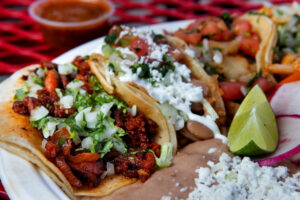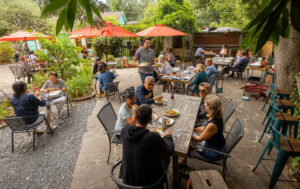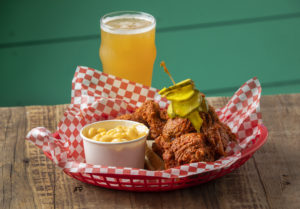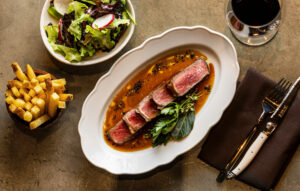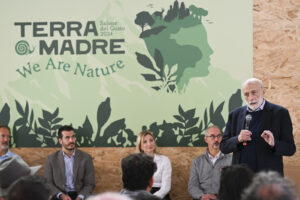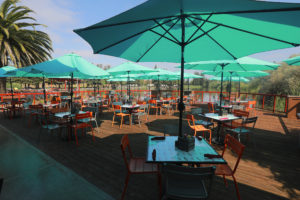I cooked this steak – with a simple red wine-honey reduction and a creamy parmigiano-peppercorn salad – in honor of one of my especially snarky fans, someone (you know who you are!) who objects strenuously every time I buy something from a supermarket for what I’ve billed as a “cooking locally” weblog:  I’ll stipulate the point, insofar as the letter of the law is concerned, but to paraphrase Ralph Waldo, zealotry is the hobgoblin of small-minded cooks, and my money says I’m not the only parent in the County who’d like to serve their kids a decent, healthy steak for a few less bucks. But is it a decent, healthy steak?
I’ll stipulate the point, insofar as the letter of the law is concerned, but to paraphrase Ralph Waldo, zealotry is the hobgoblin of small-minded cooks, and my money says I’m not the only parent in the County who’d like to serve their kids a decent, healthy steak for a few less bucks. But is it a decent, healthy steak?
 The meat in question is sold under Costco’s Organic Ranchers brand and costs $12.99/lb for USDA choice-grade rib eye; different cuts vary in price. The ultimate supplier is Dakota Organic Beef, the largest certified-organic beef supplier in the country and a part of the Meyer Natural Foods Company. From the company website:
The meat in question is sold under Costco’s Organic Ranchers brand and costs $12.99/lb for USDA choice-grade rib eye; different cuts vary in price. The ultimate supplier is Dakota Organic Beef, the largest certified-organic beef supplier in the country and a part of the Meyer Natural Foods Company. From the company website:
[We] never use hormones, antibiotics or harmful chemicals. Our cattle are born and raised on certified organic pastures in the heart of cattle country… They are vegetarian fed and finished on a diet of certified organic grains. We provide the most natural environment for our cattle including unrestricted outdoor access, humane handling and opportunities to engage in natural behaviors. [We have] made it our mission to maintain sustainable stewardship for the cattle and the environment to meet the needs of today and generations to come.
All of which are the right things to say, and I commend them for doing so, although the die-hard locavore may object to the implied road trips: the cattle are raised in Oregon, fed grain grown from the Midwest, and then processed in North Dakota, all before ending up back in Santa Rosa, where I bought my steak; the company also imports meat all the way from Australia for its ground beef. Personally, I tend to worry more about provenance than transportation, so I’d also like know whether the beasts finish out their lives on pasture, or subject to the indignities of the feedlot, but I couldn’t find the answer.
Dakota Beef depends on grain-finishing and, like many ranchers, make the case that feeding grain produces a more tender, marbled, and therefore superior product, but I have to disagree: the health benefits of 100% grass-fed beef are incontrovertible, and its flavors are cleaner, brighter, and more pronounced. In contrast, I find the softer and more densely marbled flesh of corn-fed cattle to be overly rich, flabby, and bland, and I suspect that the perception of the superiority of corn-fed beef has more to do with what we’ve been trained to expect than with any inherent quality in the meat itself.
 Flavor-wise, the Costco steak occupies a middle ground on the grass-corn spectrum, with a considerably beefier flavor and less gratuitous fat than a typical supermarket cut, but lacking the clean, grassy flavors and firm texture that I look for in the 100% pasture-based, locally farmed beef from folks like the Owen Family Farm in Hopland (sorry, no website), the Black Sheep Farm (707-874-2152), Marin Sun Farms (widely available), Wyeth Acres, or Mac Magruder (available at Willowside Meat & Sausage Factory in Santa Rosa).
Flavor-wise, the Costco steak occupies a middle ground on the grass-corn spectrum, with a considerably beefier flavor and less gratuitous fat than a typical supermarket cut, but lacking the clean, grassy flavors and firm texture that I look for in the 100% pasture-based, locally farmed beef from folks like the Owen Family Farm in Hopland (sorry, no website), the Black Sheep Farm (707-874-2152), Marin Sun Farms (widely available), Wyeth Acres, or Mac Magruder (available at Willowside Meat & Sausage Factory in Santa Rosa).
To be fair, most of these local alternatives are neither certified organic nor graded by the USDA, and they cost considerably more than the $12.99/lb I paid at Costco – ranging from a low of $14.95 for the same cut at Willowside, to more like $21 at most of the other farms – so most folks will want to take those factors into account, too. Ultimately, and at the risk of filing yet another post under “two-handed economist”, I still strongly prefer the local guys on the basis of sustainability and especially quality, but I have no objection to the Costco product, particularly at the price, and I wouldn’t hesitate to buy it again.



